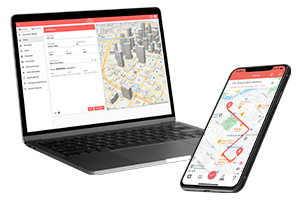April 18, 2024
Welcome to the dynamic world of Amazon Flex, a cornerstone of the modern gig economy designed for those who love freedom and flexibility in a single app. As an Amazon Flex driver, you’re part of a thriving community that values independence and control over their work schedule. However, with this flexibility comes the responsibility of managing your own operational costs and taxes. One key aspect that often gets overlooked but can significantly impact your earnings is mileage tracking. Not only does it help in saving money on taxes, but it also aids in analyzing and maximizing your earnings. This guide will explore the ins and outs of mileage tracking for Amazon Flex delivery drivers, providing practical solutions and introducing the MileageWise Mileage Tracker app as a tool designed to ease your mileage logging woes.

Why Track Mileage?
Tax Benefits for Gig Delivery Drivers
As a self-employed Amazon Flex driver, you are a so-called 1099 worker. This is because self-employed individuals receive a 1099 form from their contract employers to prove their income instead of a W-2 form that employees receive. The main difference is that taxes are withheld from the employee’s salary, while they are not withheld from independent contractors’s payments.
Understanding and managing your taxes as a gig delivery driver is crucial. Diligently tracking your miles can significantly reduce your taxable income through tax deductions.
Here’s how it works: the IRS allows you to deduct certain vehicle expenses, or a set amount per mile when you use your car for business purposes. This amount is called the Standard Mileage Rate, which is recalculated and optimized each year. Meaning, that every mile you drive while delivering packages can be deducted, effectively reducing your taxable income and therefore increasing your take-home pay.
Improving Financial Efficiency
Imagine having a clear picture of your earnings versus your mileage. In addition to maximizing your Amazon Flex mileage tax deductions, tracking your miles helps correlate your earnings with the distances you travel. Thus, it offers a solid overview of your financial efficiency.
This insight can be incredibly empowering, helping you make smarter decisions about the gigs you accept. For instance, you might find that certain routes or times of day yield better earnings per mile, allowing you to optimize your schedules and routes accordingly. Over time, this can lead to more profitable shifts and a better understanding of how to maximize your time on the road.
What Counts as Deductible Mileage?
It might seem difficult to keep IRS rules in mind while working, but don’t worry—we’ve got you covered. Essentially, any driving you do for business purposes, from the moment you leave your home to make your first delivery to when you return home from your last delivery, can be counted as deductible mileage. This includes trips between delivery locations and even quick stops for gas during your delivery shifts. However, commuting from your home to a personal location or any personal errands done in the middle of your shift are not deductible. For example, if you drive 150 miles in a day for Amazon Flex deliveries but take a 20-mile detour to run personal errands, only the 130 miles directly related to your deliveries are deductible.
How to Track Mileage Accurately?
IRS-Compliant Mileage Logs
To ensure your mileage reimbursements stand up in the event of an IRS audit, your logs must
- include the driver’s personal information,
- record information about the vehicle (each log should only cover one vehicle),
- log the date of each trip,
- include the purpose of each trip (non-deductible personal trips and commuting must be clearly distinguished),
- log start and end locations of the trips,
- record total miles driven during each trip,
- include the odometer readings at the beginning and end of the year.
Keeping an IRS-compliant mileage log for your Amazon Flex trips is easier than you think. Many drivers use a simple notebook, digital spreadsheets, or even applications; however, the key is consistency and accuracy. Ensure your logs are updated regularly, ideally at the end of each shift, to avoid forgetting crucial details. Also, be mindful of recording the specifics of each trip, noting down any deviations for personal errands as these are not deductible.
Manual vs. Digital Tracking Methods
While some drivers prefer the old-school method of manual logging, digital solutions can enhance accuracy and ease. Digital apps automatically track your mileage through GPS, ensuring every mile is counted accurately without the need for manual input at the end of a long day. These apps often come with additional features like storing digital receipts for gas and maintenance expenses, further simplifying your tax preparation process.
Digital Solutions for Mileage Tracking
Not all mileage tracking apps are created equal. When choosing an app, look for features such as automatic mileage tracking, easy categorization of business and personal trips, and the ability to generate IRS-compliant mileage reports for your Amazon Flex gig. This can save you a lot of time and ensure accuracy in your logs.
How MileageWise Can Help
MileageWise stands out with features specifically beneficial to Amazon Flex drivers. It not only tracks your miles automatically but also generates ready-to-submit tax reports.
Download MileageWise’s automatic mileage tracker app from Google Play or the App Store & try it for free for 14 days. No credit card required!

MileageWise’s unique functions
Built-in IRS Auditor
Included in MileageWise is a built-in IRS Auditor that scrutinizes mileage logs for compliance with IRS regulations. This tool checks for up to 70 potential errors or discrepancies in past logs and suggests necessary adjustments to prevent complications during tax audits.
Automatic Trip Categorization
With this feature, users can automatically sort trips into business or personal categories based on set rules, which simplifies the record-keeping process and guarantees precise reporting for tax or reimbursement reasons.
Retrospective Mileage Log Generation
For users who have not kept real-time mileage records, this function allows the creation of past logs using historical data and patterns, such as those found in Excel spreadsheets or Google Timeline, aiding in the accurate reconstruction of logs.
AI Wizard Feature
The AI Recommendation Wizard enhances mileage logs by suggesting optimal trips and configurations based on a user’s past driving habits and data. This feature not only maximizes tax deductions but also helps to accurately recreate past Amazon Flex trips to align with odometer readings and claimed tax write-offs.
Advanced Tips and Tricks
Optimizing Routes for Increased Deductions
Strategically planning your routes can significantly increase your deductible mileage while minimizing fuel consumption and time spent on the road. Consider using apps that optimize delivery routes like Waze or take some time before starting your shift to plan your path strategically. This planning can lead to more efficient trips and higher deductions.
Record Keeping
Best practices for maintaining impeccable logs include regularly reviewing and updating your logs, using digital tools for accuracy, and storing your logs safely. It’s also wise to keep all related receipts and records, such as gas and maintenance expenses, as these can provide additional deductions.
FAQs
Are Amazon Flex drivers self-employed?
Yes, Amazon Flex drivers are considered independent contractors, not employees of Amazon. This means they are self-employed and responsible for managing their own work schedule, taxes, and other business-related expenses.
How do Amazon Flex drivers pay taxes?
Amazon Flex drivers, as self-employed individuals, must handle their own tax obligations. They are required to pay self-employment tax and federal income tax. Typically, they need to file an IRS Form 1040 and Schedule C to report their earnings and expenses. It’s also recommended that they make estimated tax payments quarterly to avoid penalties and a large tax bill at year’s end.
Does Amazon Flex pay for gas?
No, Amazon Flex does not pay for gas. All vehicle-related expenses, including fuel, maintenance, and insurance, are the responsibility of the driver. However, these expenses can be tax-deductible under business mileage, which can help reduce the overall tax burden.
Can Amazon Flex drivers claim mileage?
Yes, Amazon Flex drivers can claim mileage as a business expense on their taxes. The IRS allows drivers to deduct business mileage, which can significantly reduce their taxable income. Drivers should maintain accurate mileage logs to substantiate their deductions in case of an IRS audit.
Does Amazon Flex track mileage?
No, Amazon Flex does not track mileage for drivers. Drivers must track their own mileage for business purposes, such as deliveries and returns. It’s important for drivers to maintain accurate records either through manual logging or by using a digital mileage tracking app, which can help simplify record-keeping and ensure accuracy when claiming tax deductions.
Conclusion
Tracking mileage as an Amazon Flex driver isn’t just about staying compliant; it’s about optimizing your earnings and achieving peace of mind. With the right tools and knowledge, such as using the MileageWise app, you can choose the best tracking method and truly drive your success to new heights.
Download MileageWise’s automatic mileage tracker app from Google Play or the App Store & try it for free for 14 days. No credit card required!
| MileageWise | TripLog | MileIQ | Everlance | Driversnote | SherpaShare | Hurdlr | Excel | |
User Ratings (Trustpilot) | N/A | N/A | N/A | |||||
iOS App User Ratings | ||||||||
Android App User Ratings |
| |||||||
Average Possible Business Mileage Deduction | $12,000 | $6,300 | $8,400 | $6,500 | $6,000 | $5,600 | $5,600 | $200-$2,000 |
Imports Trips and locations from Google Timeline | ||||||||
Produces IRS-Proof Mileage Logs | ||||||||
Creates Retrospective Mileage Logs | ||||||||
AI Wizard Technology for Mileage Recovery | ||||||||
| Sampling / Recurring Daily Trips | ||||||||
| Mass Distance Calculation | ||||||||
| Built-In IRS Auditor for 70 Logical Conflicts Correction | ||||||||
| Web Dashboard | ||||||||
| Mileage Tracker App | ||||||||
| Vehicle Expense Tracker | ||||||||
| Manual Trip Recording | ||||||||
| Bluetooth Auto Tracking - with no hardware needed | ||||||||
| Plug'N'Go Auto Tracking | ||||||||
| Vehicle Movement Monitoring | ||||||||
| Battery and Data Friendly | ||||||||
| Other Software Integrations | ||||||||
| Trip List Import from other Mileage Trackers | ||||||||
| Trip List Import from GPS | ||||||||
| Shared Dashboard for Teams | ||||||||
Features are all related to mileage tracking | ||||||||
Pricing | Price list | Price list | Price list | Price list | Price list | Price list | Price list | Price list |



